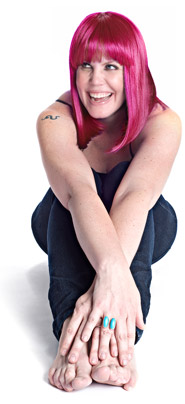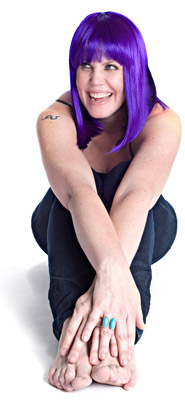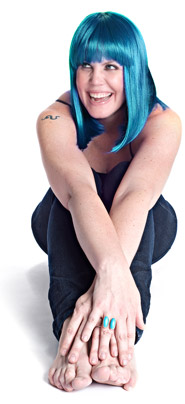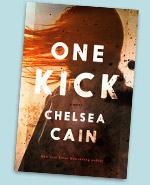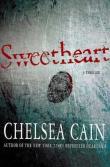It was our first “new puppy” visit to the vet. Our first Boston Terrier. About twenty years ago. Her name was Lucy. We were finishing up. Our vet was cool, young, tattooed. We liked her a lot. We were all in our twenties.
“Before you guys go I just want to make sure you know what to do if your dog’s eye pops out,” she said.
She said it casually. Like a P.S. Like a thing a person might say, like, “I just want to make sure you know how to jump start a car,” or “I just want to make sure you know how to plunge a toilet.” In the category of a thing that will happen, at some point, and gah, it will be unpleasant, so best to be prepared.
“Excuse me?” I asked.
It was a Boston Terrier thing, she explained. Or a pug thing. Or a boxer thing. Dogs with bug eyes. Sometimes, she explained, their eyes popped out. She shrugged, like what are you gonna do?
I remember the example she used was that they might clip a coffee table. And then POP. “The important thing,” she said, “was not to panic.”
I made a mental note. NOT. TO. PANIC.
“Just get a damp clean washcloth and pop the eye back in,” she said.
She explained that when a dog’s eye pops out a lot of times their people start running around and sobbing uncontrollably and that the damage to the eye actually happens on the way to the vet when it’s just dangling there while the people are grappling their pet. (I’m summarizing.)
I looked down at our nine-week-old perfect puppy and swore to myself that if/when her eye popped out, I would be ready.
I thought about it all the time after that. For years. I winced every time Lucy passed a coffee table. We were first-time parents, my husband and I - this was our first dog - we worried.
Damp clean washcloth.
Damp clean washcloth.
Damp clean washcloth.
When I met other owners of Boston Terriers, I asked them if they knew what to do if their dog’s eyes popped out. You know how it is, at the dog park. “What’s your dog’s name?” “Who’s their ophthalmologist?”
Chuck Palahniuk (another Boston Terrier owner) and I talked about it a hundred times. We both have very violent imaginations. We ran through what we would do. Mental drills. Just as later we ran through what to do when the brakes on our Priuses failed (shift to neutral, step on the parking brake, turn off the ignition, DON’T PANIC).
Be prepared. See?
It was easy.
Eye popping became such a worry of mine that I wrote a short story about it, a horror story.
When Lucy died (this was eight years ago, she was old, but it still makes me sad) she had both eyes intact.
I exhaled.
Our next Boston came from a puppy mill. I didn’t know it at the time, though the fact that I had to pick her up in the parking lot of a McDonalds should have been a clue. (“What kind of car will you be driving? I’ll find you.”)
We named her Rosie Vixen Towel Rubber because our daughter was four.
Rosie was special. Maybe clinically special?
If I’m really being honest she caused some friction in my marriage. Because, if I’m really being honest, I was an asshole. I had wanted a puppy for my birthday and my husband thought another pet wasn’t a good idea and he wasn’t on board. I kept asking. Finally he said something along the lines of “Fine, you’ll do what you want anyway,” which I took to mean “Go ahead and get a puppy!” If you speak “husband,” you know that this is not an accurate translation. But there we were - a week after my birthday - me, fresh from the McDonald’s parking lot with this very quirky dog. By quirky I mean that Rosie almost certainly had Down’s Syndrome.
My husband came to love her. I want to make that clear. And I learned an important lesson about not bringing home pets (or crab-shaped dining room sets) without making sure we were on the same page.
Rosie was a weird dog. But she was always sweet. When we brought home a corgi puppy years later (with a family contract signed by all involved), she let him chew on her cheeks until they were scabby. She raised that dog like he was her own.
So, as you’ve probably guessed, Rosie died. She was old. If I’m being honest, we don’t know how old. I thought she was 13. That’s what I’ve told people. But the emergency vet clinic (where we’d taken her once after an allergic reaction to a yellow jacket sting years ago - oh my goodness she was lumpy) had her age at 10 and change. When we work it out as a family - how old Eliza was when we got her - we come out to about 12.)
Over the last six months Rosie deteriorated mightily. Ha. Whom among us hasn’t? Rosie is ALL OF US.
She had a half dozen tumors/cysts - some the size of kumquats. Her paws bled for no reason. She was blind and mostly deaf, and she couldn’t smell very well. She had arthritis and fell down the stairs, and sometimes tripped on the sidewalk and face-planted and skinned her chin. Because her senses were so limited she was intent on following me around the house everywhere - something she had always done - but now did obsessively, because if I managed to leave the room, she had a hard time finding me. So every time I went downstairs, I had to carry her with me. So she wouldn’t follow and fall. When we woke up in the morning the first thing I did was to carry Rosie from our bed to the front yard so she could pee, and then to the couch, where I would read the paper beside her and then (if she was up for it) take her and the corgi for a walk - which lately almost always meant taking Rosie for a half block walk and then carrying her the rest of the walk or returning her home and leaving again with the corgi.
Rosie has a history of eye ulcers. Bug eyed breeds. It’s a fact of life. Ask a canine ophthalmologist. Once we had to give Rosie 5 different kinds of eye drops every two hours. For two weeks.
Like I said, she’s quirky.
A week ago she developed an irritation, an ulcer, in her left eye - this is the eye that always gave her trouble. Usually it clears up on its own after 3-5 days. It’s not pretty. It hurts. It’s an ulcer. In the eye.
This one didn’t clear up. It got worse.
Here’s the thing.
I should I have taken her in to see her vet, to see her ophthalmologist. I was worried.
We’re not allowed into any of these places - it’s just parking lot handoffs to vet techs. You hand your baby to a stranger and then sit in the car for a few hours, waiting for news. I was afraid. I was afraid they’d see all her tumors, that they’d listen to her heart murmur and ask us if we’d make an appointment with the cardiologist yet.
Today is my birthday.
This morning I took Rosie from our bed and carried her down to our front yard and - I don’t know how to put this differently, I’m sorry - her eye exploded. This is a complication that can happen with eye ulcers, apparently.
Damp clean washcloth.
Damp clean washcloth.
Damp clean washcloth.
Jesus Christ, how many times did I go through that mental drill?
Her eye exploded.
And I’m standing there in our front yard, in my PJs, no coffee. And this thing that I have worried about for decades has happened. And all I can do is cry out to my husband. And then he’s there, in his PJs, and he’s saying “What should I do?”
And I can’t find the words.
Or can’t form them.
[Yes, I know my tense is all over the place here.]
All that mental prep, all the drills - gone. I am helpless. I stammer. I’m sobbing.
I say, “clean washcloth.”
Understand that I am shaking now, hyperventilating at this point.
“Clean washcloth.”
He hesitates. “Should it be… damp?”
“Yes!”
He runs upstairs. He’s gone forever. Maybe half a minute. He returns with a hand towel, having not been apparently able to locate a clean washcloth.
I try to hold it to Rosie’s eye - which, again, not to gross you out, but there’s a lot of blood and eye goop involved when an eyeball explodes. It is…intense.
Rosie is clearly in distress - because, obviously - but she’s also kind of frozen - she’s not frantic - she’s not pawing at her face - she’s just like, holy shit.
So I take this damp towel and lift it to Rosie’s eye.
I have, after all, been waiting for this moment - preparing for it - for half of my adult life - and then I realize, no.
Her eyeball has not popped out.
It has POPPED.
This is an entirely different situation!
I have been preparing for the wrong emergency. An adjacent one. But totally different.
The husband and I trade the dog back and forth and pull on our clothes.
Then hustle into the Prius with our daughter and head to the emergency vet.
A vet tech comes and takes Rosie from our car.
We wait.
We wait so long our car battery dies and we have to call Triple AAA.
Rosie has suffered a ruptured cornea. That’s the fancy term for a “popped eyeball.” That goop was the stuff in her eyeball, leaking out. She needs to have her eyeball - or what’s left of it - removed. This should be simple, but it’s not. It’s a whole thing. Rosie, with her heart murmur and her tumors, our girl who we hoped would make it through the holidays, in a perfect world there would be an echocardiogram and a cardiologist consult and a surgeon and full blood work and all the rest, and we don’t live in a perfect world. And they have options. We can skip the cardio consult and go with the riskier approach. But then what? She’s been suffering for months. Her world is so small. She can’t see or hear us. And yet she still knows we’re there. At what point do we make this stop?
I guess now.
“She is clearly greatly loved,” the vet wrote in our discharge papers.
Another parking lot. Another birthday.
We gathered up our girl and took her home. And we called a doctor to come to our living room and give her peace.
After a last meal of cheese pizza from Hot Lips, her favorite. She died happily, with all of us telling her over and over and over again that she was a good dog.
Then she fell asleep.
Rosie always loved to sleep.
The doctor left to give us a few minutes with her body. We were all sobbing, obviously. And then we heard the doctor come back to the door - but it turned out to be a Fed-ex delivery person with a package.
It’s my birthday, remember?
It was a box - a cake, it said on the label. We brought it in and set it down, and then the doctor returned and we set our girl in a basket and the doctor took her away to be cremated.
And we cried.
Because Jesus Christ losing a dog is hard.
And then I remembered the boxed cake. And I went to open it. Because I didn’t know who it was from, and I wanted to be able to send the person a text and I was also like, really, a boxed cake? So I opened it, all of us crying, and sure enough, there’s a box inside with a lid and instructions for how to open it - basically lifting the lid off the box - which seemed, I don’t know, kind of obvious - and I lifted the lid - and a dozen butterflies exploded from the box. They fluttered and spun through our kitchen! - not real butterflies - don’t worry - paper ones - and the box sides fell open and there were pictures of me and candy and a very tiny cake. And we were all so - I don’t know - stunned - I think I might have shrieked. And we all laughed so hard. Because it was so beautiful. And it took us by the shoulders and shook us from our grief. And it was exactly what we needed. It was the most perfect gift I’ve maybe ever gotten.
Anyway.
It’s 11:48.
And that was my birthday.
We had a dog.
We loved her hard.
And she died.
And all in all, it was okay.

